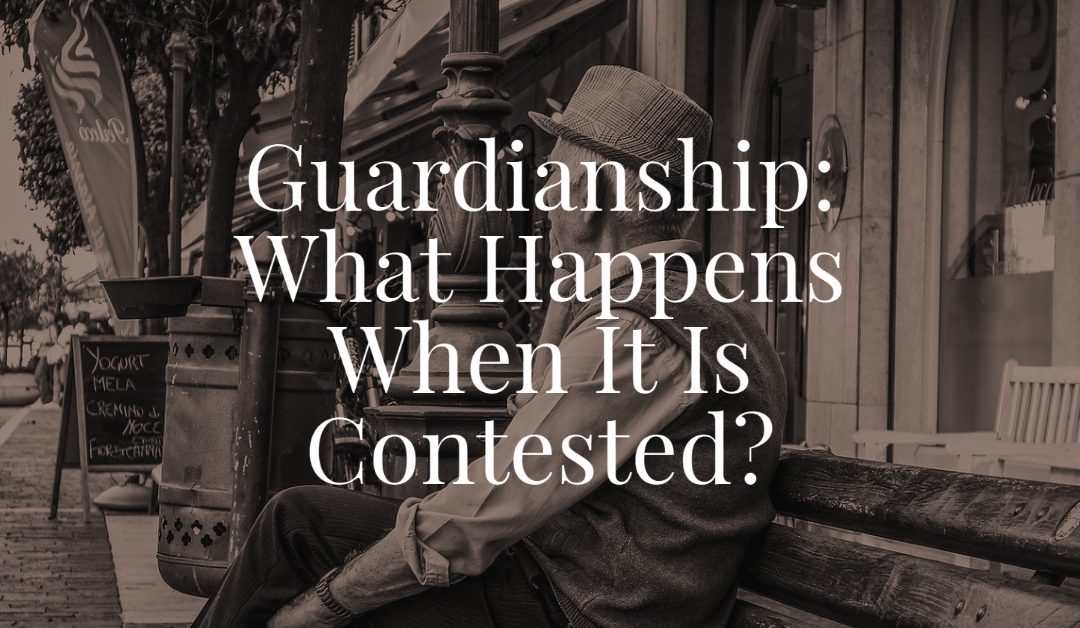As an adult, there may come a time in your life when you need the help and support of others to live your daily life. If this happens, you may need a guardian. The court orders a guardian for anyone who is severely disabled, incompetent, or incapacitated and needs help to live safely. If the court desires to appoint someone you don’t want or that other family disapprove of, you may contest the guardianship. But what happens when you contest a guardianship?
What Happens In a Contested Guardianship?
When you contest a guardianship case, family members must argue their position in court. This courtroom drama can be stressful for you as it uncovers everything about your personal life and abilities. The focus may be on the silly mistakes you’ve made with money. Or perhaps focused on your tendency to get argumentative with your doctor and refuse medical treatments.
For example, if you have a heart condition that requires a medication that you refuse to take, your family may make a case that you are incompetent and need a guardian. However, there may be nothing inept about your choice. After all, it is your life and body affected by the medication. Perhaps you just need a new doctor.
You may present a case to the court that you can handle your own life and need no guardian.
When the family lays all of your medical, personal, and financial decisions out in court to show your incompetence, it can feel like an attack. A level of humiliation may exist for you. For this reason, and to understand what is truly going on, the court may bring in an expert to help.
The Court Appoints a Guardian Ad Litem
Often, the court will appoint a guardian ad litem to investigate and stand with you in court. The guardian ad litem is an expert who carefully considers and investigates all angles of your living conditions and ability to care for yourself. Guardian ad litems are generally attorneys with extensive guardianship law knowledge, so the recommendation is taken quite seriously by the court.
The guardian ad litem may meet with your family members, doctors, counselors, community group members, and neighbors. They will look at your medical records and consider every aspect of your life and whether you are a competent adult.
Types of Guardianship
Guardianship may include financial or estate guardianship, guardianship of the person, or both. Let’s look at exactly what these types of guardianship are:
- Guardian of the Person: this is someone who makes sure that your daily needs are met, such as grocery shopping, day-to-day care if you are incompetent or incapacitated, household needs, etc.
- Guardian of the Estate: This is an appointed individual who cares for your finances. They manage all of your business or household banking, retirement accounts, and general budget.
- General Guardian: This kind of guardian is both Guardian of the Person and Guardian of the Estate. They handle everything you need care for.
Avoiding a Guardianship Contest
There are ways to avoid guardianship proceedings. Avoiding this courtroom saga may be in your best interest. You may draw up a Durable General Power of Attorney with your lawyer before you face a guardianship proceeding. This document can help keep your independence until you genuinely need help.
For example, if you have a diagnosis of Dementia, you may worry that you will lose your ability to function in society. You may dread the day that you no longer can make your own decisions. However, when you appoint a durable general power of attorney, you choose to trust someone who knows what you desire for future care.
Appointing a durable general power of attorney lets you have a conversation with a trusted loved one about how you would like to be cared for. You can plan for this person to show you the respect and dignity you deserve as you age rather than letting a court choose for you.
Without a durable general power of attorney, your life is open to control from others if you reach a level of incompetence. A durable general power of attorney puts your life decisions back into your own hands.
We Can Help
At Hopler, Wilms, and Hanna, we often act as guardian ad litem for those needing help. We see the process play out in the courtroom and know how difficult it can be for those facing a potential guardianship. If you’d like to discuss your situation with attorneys experienced and knowledgeable in guardianship law, contact us. Find out how we can help you move forward with the best possible solutions for your future.

